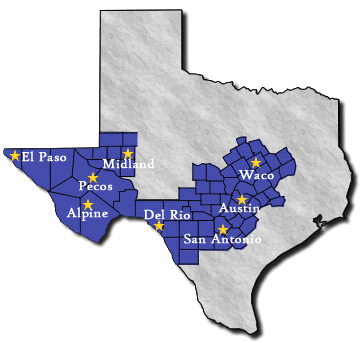“Delaware had 174 new cases in Q1; West Texas, 158. Of those, 128 were brought by NPEs (including subsidiaries of aggregators like Oso IP, Fortress, IP Edge, Longhorn, Acacia, and others). That means the Western District is on pace for 600 patent cases in 2020.”
 The Q1 2020 Patent Dispute Report, now available on Unified’s website, shows that the Western District of Texas is definitively the new hotspot for patent cases. Given the precipitous rise in filings there, it is on track to surpass Delaware for the most new filings of 2020—more than 600 are projected—all while Judge Alan D. Albright has yet to complete a patent trial (which is unsurprising, given how often patent suits settle). And with COVID-19 pushing trial schedules back, it seems unlikely he’ll have his first any time soon.
The Q1 2020 Patent Dispute Report, now available on Unified’s website, shows that the Western District of Texas is definitively the new hotspot for patent cases. Given the precipitous rise in filings there, it is on track to surpass Delaware for the most new filings of 2020—more than 600 are projected—all while Judge Alan D. Albright has yet to complete a patent trial (which is unsurprising, given how often patent suits settle). And with COVID-19 pushing trial schedules back, it seems unlikely he’ll have his first any time soon.
Ever since the Supreme Court’s decision in TC Heartland, patent filings have been shifting from the Eastern District of District of Texas to the now-significantly backlogged District of Delaware, the Northern District of California, and another handful of far-flung districts. But with President Trump’s appointment of patent litigator Alan D. Albright to the bench, and his subsequent working group, publication of aggressive local patent rules, and his urging that parties bring patent cases before him, it now seems the Western District is poised to surpass all others in patent filings.
West Texas includes Austin and other metropolitan areas, where plentiful business and technology ties make it much more likely that parties will be able to establish venue under TC Heartland. A few recent denials of writs of mandamus on issues like the customer exception of the first-to-file rule and direct venue (and forum non conviens) challenges to Judge Albright’s early rulings on venue suggest that most cases are likely to stay in the Western District—something that has attracted a wide variety of non-practicing entities to West Texas in a very short time.
Our regularly published litigation report shows that, for the first quarter of 2020, just over 80% of the cases filed in West Texas were brought by NPEs, with only Delaware receiving more new patent complaints. Delaware had 174 new cases in Q1; West Texas, 158. Of those, 128 were brought by NPEs (including subsidiaries of aggregators like Oso IP, Fortress, IP Edge, Longhorn, Acacia, and others). That means the Western District is on pace for 600 patent cases in 2020. A number of those filings are attributable to a handful of parties—Castlemorton Wireless, for instance, filed 21 complaints; WSOU Investments, 17; Neodron (a Magnetar entity), 8. And foreign technology companies seem to have eclipsed US-based ones in terms of the overall number of suits in which they were targeted, at least for Q1.
The Western District uptick is easily attributed to Waco filings before Judge Albright (though it seems inevitable other District judges—like Judge Yeakel in Austin—will inevitably receive some cases to help manage the ballooning docket). With an aggressive filing schedule, streamlined Markman proceedings, and patent expertise, it isn’t much of a leap to say that it’s become an attractive forum in which to file. Add to that the relative lack of TC Heartland problems and the (as of now) lack of docket congestion there (as compared to Delaware, where trial times have been ticking up under the strain), and you can see why parties might be driven to file there rather than anywhere else—particularly those looking to go to trial or drive quick settlements. On the other side of the coin, Judge Albright hasn’t been shy about enforcing strict discipline against outlandish claims—most recently in a fiery order against Gabriel De La Vega, Jr., whose Facebook threats and outlandish behavior seem to have earned him (and his counsel) the good Judge’s ire.
But while filings have shifted, overall, district court activity has held steady—neither up nor down significantly since last year. Thus far, PTAB filings have also held steady over last year, and least in Q1. That puts the forecast for the year at 3,364 new district court cases, which is on a par with last year; and PTAB filings, down significantly in 2019 from 1700 in years previous to roughly 1300, seems likely to also repeat itself, suggesting that the major reforms of USPTO Director Andrei Iancu have substantially reduced the utility of PTAB proceedings.
The numbers also demonstrate that small to medium-sized entities were sued 270 times, or roughly a third of all patent litigation filings, and show that NPEs continue to account for some 85% of patent assertions in district court in the high tech space, and represent 68% of all high-tech-related PTAB proceedings.
In sum, litigation remains steady, PTAB proceedings look to again be down in 2020, and the pronounced shift to the Western District that began in 2019 continues apace.
For more information please read the full Report.
Map from Justice.gov. Public domain.

![[IPWatchdog Logo]](https://ipwatchdog.com/wp-content/themes/IPWatchdog%20-%202023/assets/images/temp/logo-small@2x.png)

![[Advertisement]](https://ipwatchdog.com/wp-content/uploads/2024/04/UnitedLex-May-2-2024-sidebar-700x500-1.jpg)
![[Advertisement]](https://ipwatchdog.com/wp-content/uploads/2024/04/Artificial-Intelligence-2024-REPLAY-sidebar-700x500-corrected.jpg)
![[Advertisement]](https://ipwatchdog.com/wp-content/uploads/2024/04/Patent-Litigation-Masters-2024-sidebar-700x500-1.jpg)

![[Advertisement]](https://ipwatchdog.com/wp-content/uploads/2021/12/WEBINAR-336-x-280-px.png)
![[Advertisement]](https://ipwatchdog.com/wp-content/uploads/2021/12/2021-Patent-Practice-on-Demand-recorded-Feb-2021-336-x-280.jpg)
![[Advertisement]](https://ipwatchdog.com/wp-content/uploads/2021/12/Ad-4-The-Invent-Patent-System™.png)






Join the Discussion
2 comments so far.
Jonathan Stroud
April 6, 2020 12:51 pmIt’s also worth noting that Judge Albright has issued standing orders that all Markman and motions hearings will be conducted telephonically, back-to-back, and that the schedules for those will not deviate.
Jonathan Stroud
April 5, 2020 04:06 pmAs a brief update, a litigator more experienced than I passed along that he did have one trademark bench trial, and he had another scheduled for last month, Finalrod v. Crane, but it was postponed. Which, again, 15 or so months into his time on the bench, isn’t really all that remarkable.